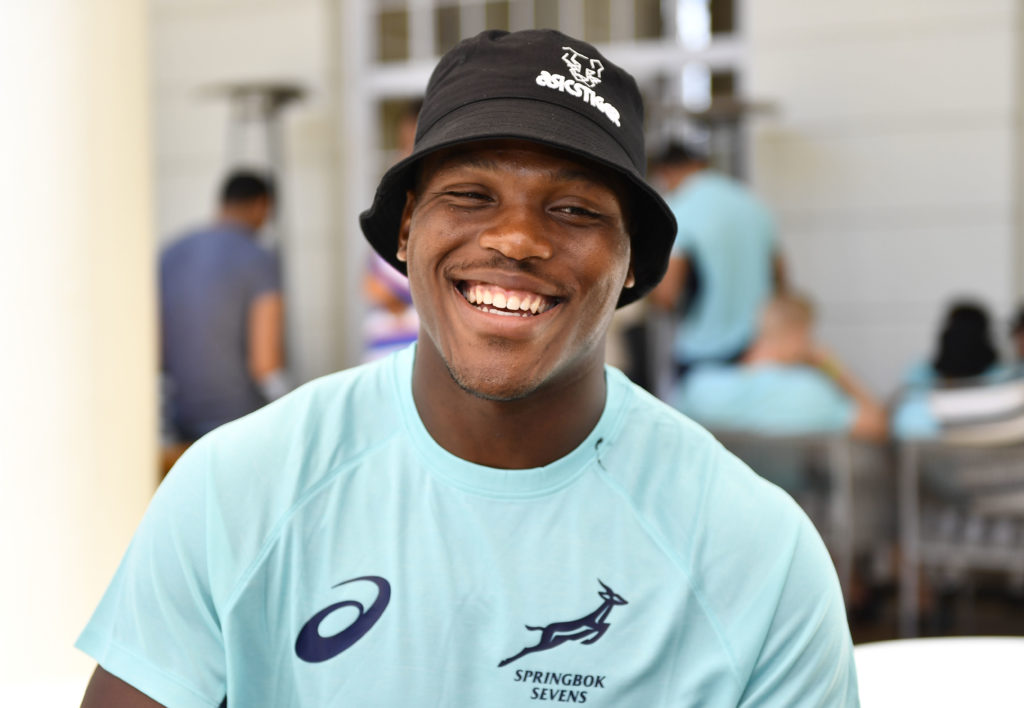Lions loose forward Hacjivah Dayimani has opened up about his upbringing in an inspirational self-penned letter published by the Johannesburg team.
In the letter, Dayimani revealed how he escaped a life of crime and poverty, going through three provinces, five schools and countless hardships before making it big at the Lions.
‘If you had asked me 10 years ago where I see myself, I would’ve told you on the streets as a gangster,’ Dayimani wrote.
‘I come from a family of dropouts.
‘My older brothers dropped out of school in Grade 11. My older sister did the same in Grade 10. I have six cousins – all of them dropouts. So the pressure was on me. It felt like it was a case of when I was going to do the same and drop out, rather than if. And the opportunity was certainly there for me to do so.
‘My father was absent in my life. Basically, my mother and father met at an event, and I was a mistake. I knew about my dad, but didn’t have a personal relationship with him. I had maybe spent a weekend or two with him. Then he remarried and I lost contact with him. My mother couldn’t afford to look after me. Where we lived in Cape Town, I used to sell oranges on behalf of the landlord to help pay for our rent. I was 10 years old and learning how to trade and do business, which has stayed with me all of my life.
‘Unable to properly care for me, my mother sent me to live with my grandmother in the Eastern Cape, near the town of Cradock. That meant I would’ve had to attend a Xhosa school in the township, and I couldn’t speak Xhosa. Then somehow my grandmother found a way to get me into the local primary school in Cradock. I’d only played soccer up until then, but the school didn’t offer soccer. They played rugby. So I started playing rugby, and played a variety of positions from wing to prop. What really started my love for rugby was watching the 2007 Rugby World Cup final and seeing Bryan Habana diving over the tryline when he scored. I wanted to play a sport where I could dive just like that.
‘I only spent a year in that school, though. I found out how my grandmother had managed to get me in there, and when I did it was one of the lowest moments of my life. My grandmother gave me a school uniform, and I remember going to school one morning and playing touch rugby before class. It was hot, so I took off the jersey. The bell rang and I went to class, but I forgot the jersey on the field. A while later the groundsman came into the class and asked for Michael. He said he had found a jersey on the fields and it had the name Michael in it. That’s when it really hit me that my uniform belonged to another kid in the school whose parents were wealthy. The same family my grandmother worked as a domestic for. I was in the school because they had helped pay for it. And I wore their child’s uniform. I know it’s just an ego thing, but I felt pretty low about that. I was the kid who had nothing. I was the kid in this school whose grandmother was a domestic worker, while they all had parents who were doctors and lawyers and so on. My grandmother was basically living off grant money and using that money to pay the loan sharks she was lending from. We lived from debt to debt. It was a never-ending cycle, and she couldn’t keep it up in terms of my schooling there.
‘So when I had to leave Cradock Primary, my grandmother made contact with my father in Johannesburg. I think she knew there was no future for me there.
‘At the age of 12, I left my grandmother’s house and hiked to Johannesburg to begin life under my father’s roof. This was a difficult time because the only sport my father would allow me to do was boxing. I hated it because, as a result of my size, I was always being forced to box in much-older age categories. So I continued to play rugby in secret.
‘While attending President High School I was offered a rugby scholarship at Jeppe High School and became a boarder there. My rugby career really started to take off here and I made it into the First XV and later the South African Schools team and then went straight from school into the Lions squad. My father said later he understood then why I had disobeyed him about rugby, and I’m really glad we resolved that before he passed away.
‘I think the message from my life is that you can make excuses, but that doesn’t mean your problems will go away. And, if you give up, you just stay where you are. So I’ve always figured, what’s the point of that? You might as well just keep going.
‘As I’ve said, I’ve had plenty of opportunities to drop out and give up. I’ve been to about seven schools in my life. While at President High School in Johannesburg I sold sweets and chips for bus money. I’ve worked at a petrol station to earn a living. You know the petrol station in Beaufort West? The Engen on the main road when you drive through the town? Well, I worked the night shift there. It was the worst job I ever had, and to this day I have the utmost respect for petrol attendants. I’ve had to go and eat at soup kitchens to get a meal.
‘I’ve struggled to a point where I don’t have any lows anymore. And you know what I’ve realised? We’re all so different in life. We’re like popcorn. We all get put into the same pan with the same heat, but we don’t all pop at the same time. Whatever I go through now is so small compared to where I’ve come from. I’m grateful for whatever I have.
‘So this Covid-19 pandemic is hard, but just remember, you’ve probably overcome some pretty hard things in your life as well.
‘Everybody deals with difficult things in their life, and they do so in their own way. But overcoming is what brings us together. My life has been saved, and I’m very grateful for where I am today.
‘And you know what? I’m the first one in my family to matriculate from high school. I’m the first to make it.
‘I didn’t drop out.’
Photo: Ashley Vlotman/Gallo Images





